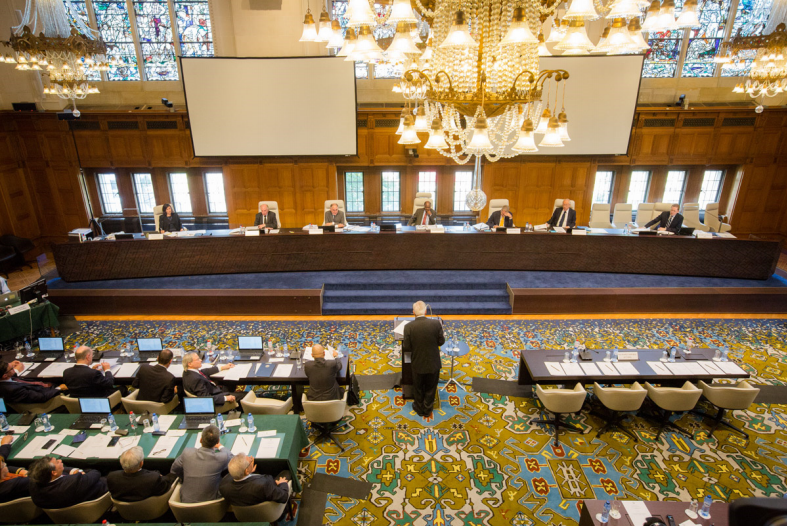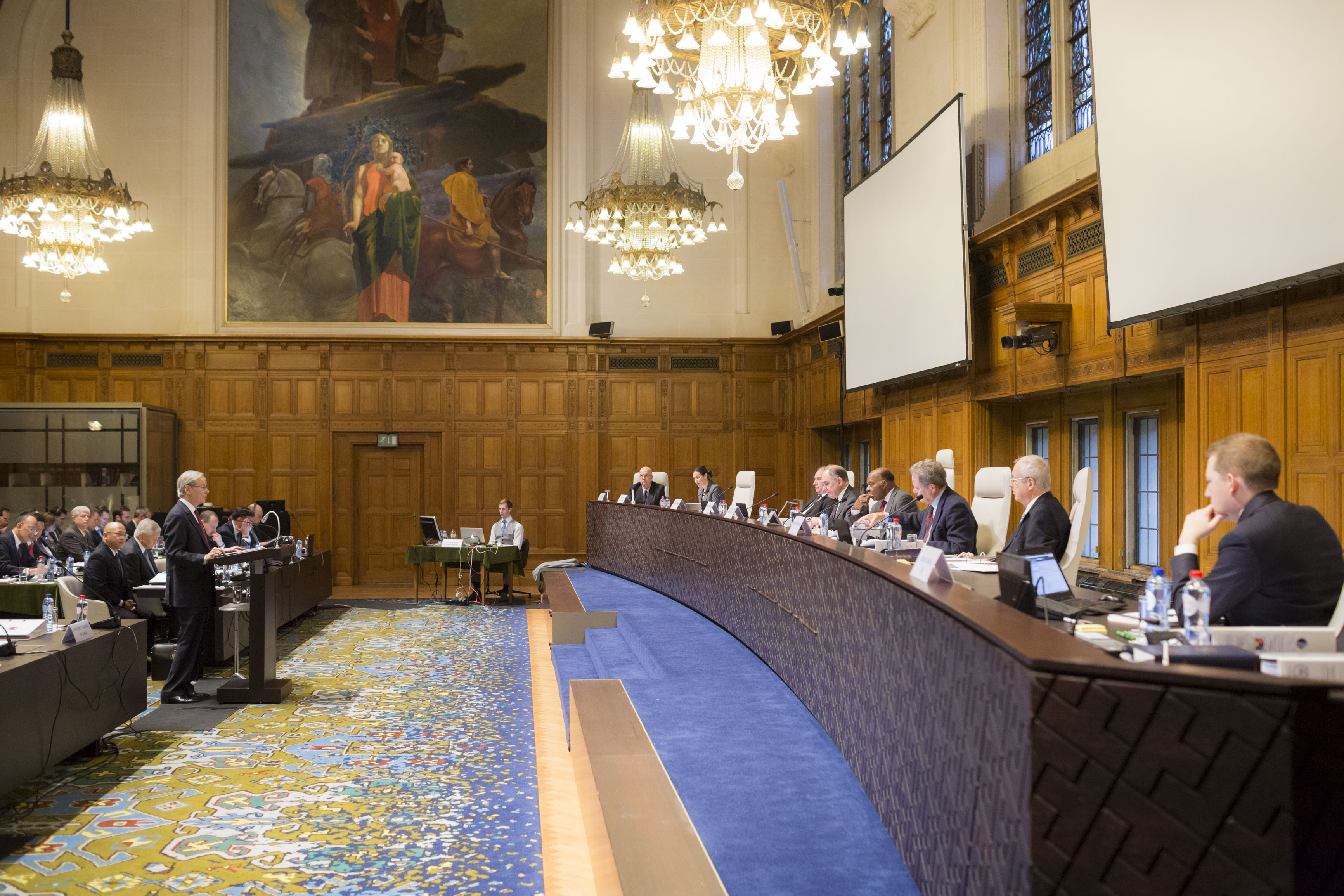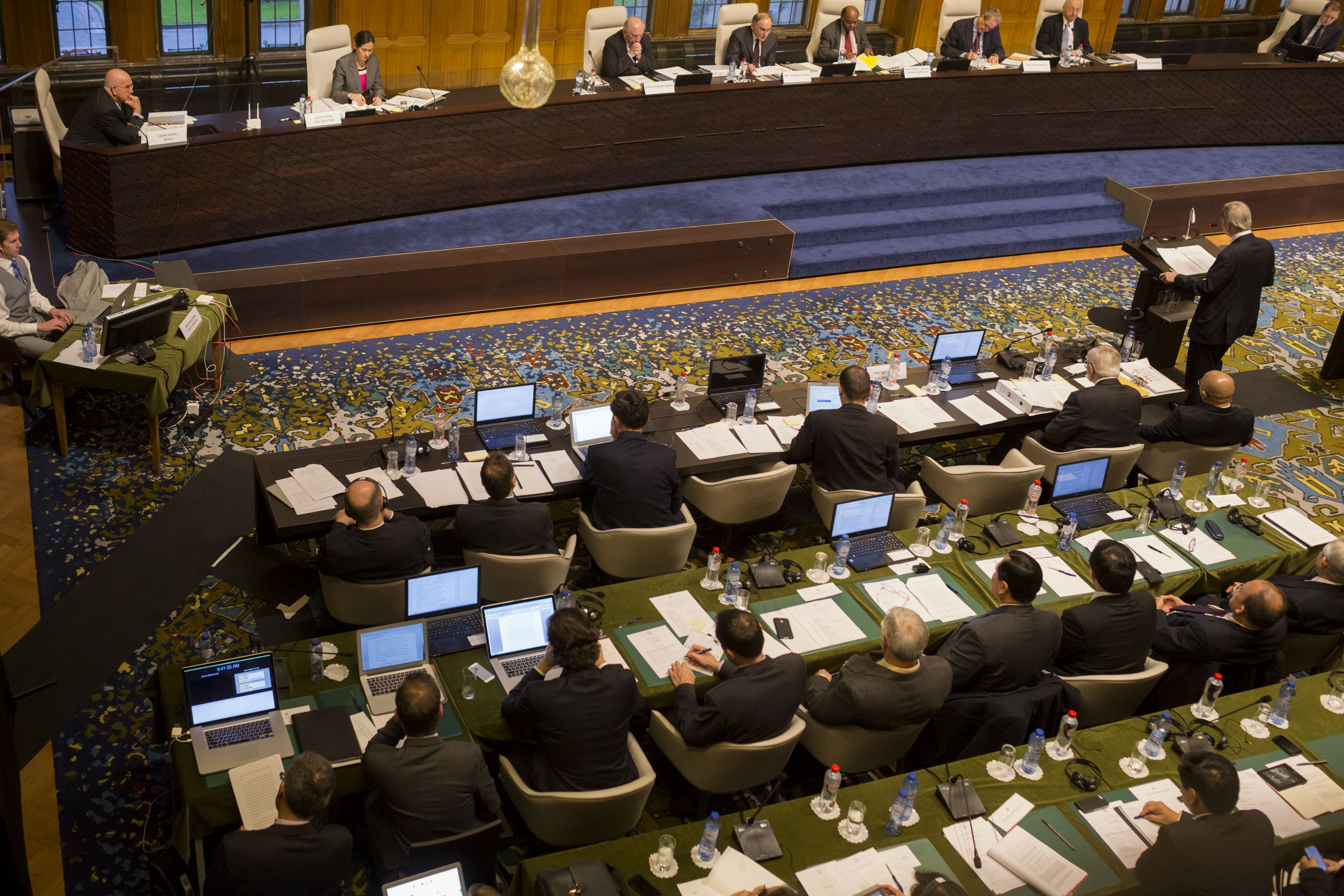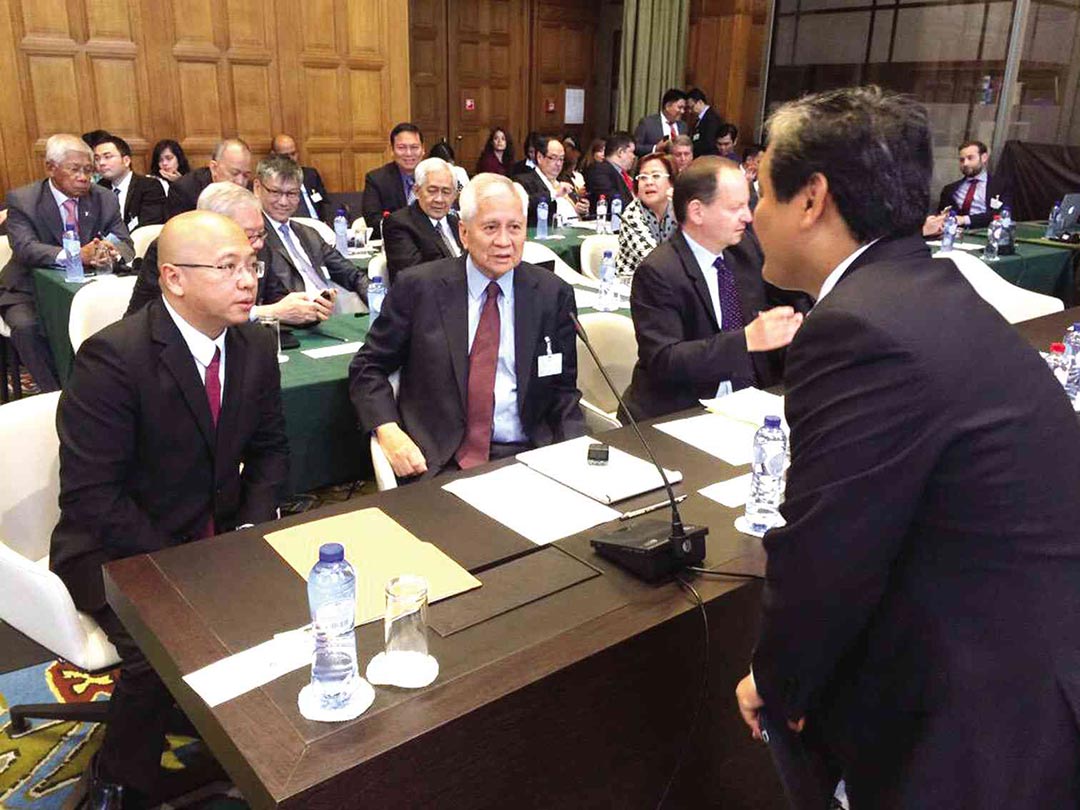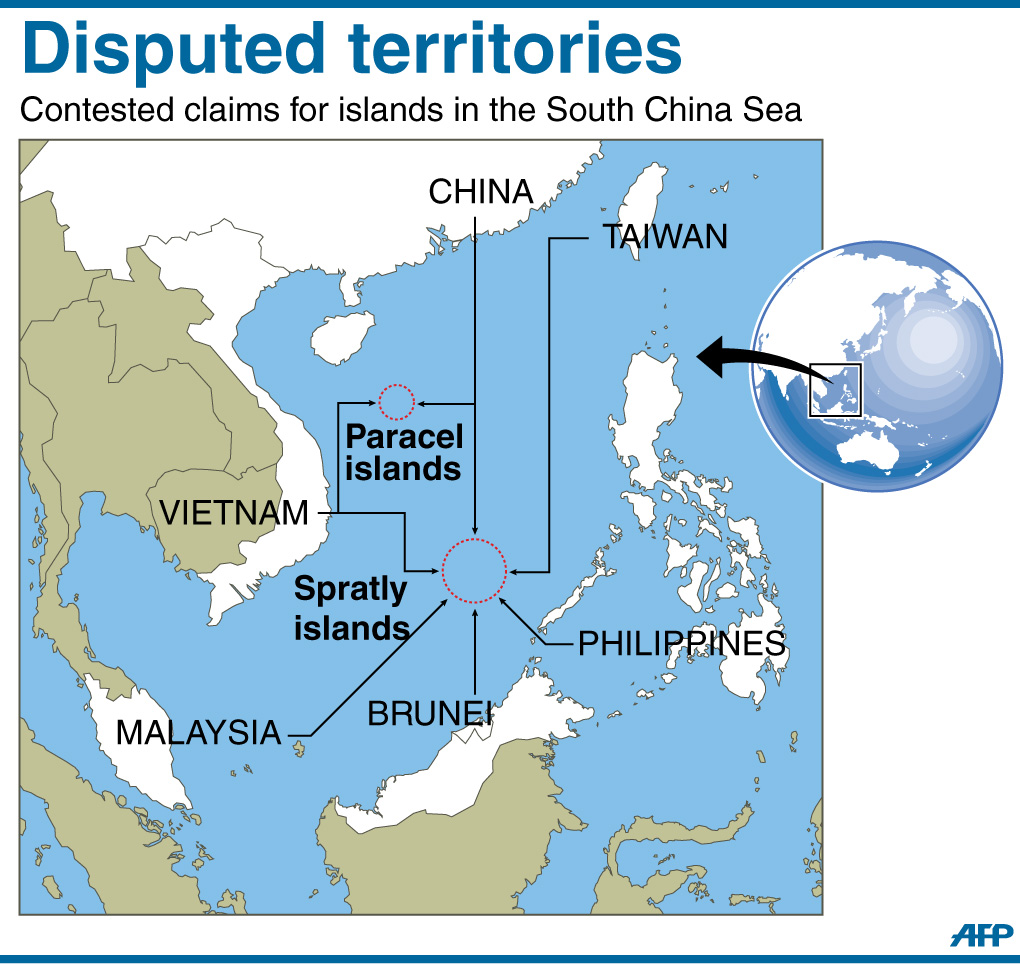FULL TEXT: Closing remarks of DFA Secretary Albert del Rosario in last day of Merits Hearing
CLOSING REMARKS ON LAST DAY OF MERITS HEARING
Republic of the Philippines v. People’s Republic of China
HON. ALBERT F. DEL ROSARIO
Secretary of Foreign Affairs
30 November 2015
Mr President, distinguished members of the Tribunal, good afternoon. Before our Agent, the Honourable Solicitor General, presents our final submissions, it is my honour to respectfully address you one last time in this Great Hall of Justice.
When I first had the privilege of appearing before you in July, it was at the beginning of the hearings on jurisdiction. We did not know then whether or not we would ever reach this point. The Philippines, however, never doubted this Tribunal’s jurisdiction. But there are some who could not believe that the Arbitral Tribunal would have the courage to apply the law to a country like China.
READ: UNCLOS explained: Why China’s claims in South China Sea are invalid
There are those who think the rule of law in international relations does not apply to great powers. We reject that view. International law is the great equaliser among states. It allows small countries to stand on an equal footing with more powerful states. Those who think “might makes right” have it backwards. It is exactly the opposite, in that right makes might.
Article continues after this advertisementThat is why, in January 2013, we confidently put our fate in the hands of this Tribunal and the compulsory dispute resolution mechanisms of UNCLOS. With your wise guidance, we have come a long way.
Article continues after this advertisementMr President, distinguished members of the Tribunal, the 29th October Award on Jurisdiction is a remarkable document. It will not only stand the test of time, it will be a model for ages. It is remarkable in many ways, most especially for its moral strength. It is a compelling rebuke to those who doubt that international justice does exist and will prevail.
READ: Key points of the Arbitral Tribunal’s decision in PH vs China case
I say this not just as the Secretary of Foreign Affairs of the Philippines, but also as a global citizen. It is not just the fate of the Philippines that rests in your hands. I note the presence of the distinguished observers from Australia, Indonesia, Japan, Malaysia, Singapore, Thailand and Vietnam, and I thank them for their presence. Other countries too are watching to see what this Tribunal will do.
It is fitting that these hearings are ending as 2015 itself draws to a close. This year marks the 70th anniversary of the United Nations. That great institution is an expression of the best in us. It is unfortunate that it took one of the saddest episodes in human history to create it. Yet those of us who lived through that episode also remember the hopes for a new chapter in our common history. We dared to envision a future of enduring peace, shared prosperity and a new era of collaboration.
When we started this arbitration, the Philippines was fulfilling one of its most solemn duties, which is to settle international disputes peacefully. The Tribunal knows that our disputes with China in the South China Sea have, for a very long time, complicated our relationship.
READ: PH power team to The Hague; UN tribunal to rule first on jurisdiction
Two centrepieces of that new order were: the sovereign equality of all states; and the commitment to settle disputes peacefully. The sovereign equality of states is enshrined in the first substantive provision of the UN Charter, Article 2(1). The obligation to settle disputes by peaceful means appears subsequently in Article 2(3).
Mechanisms for the compulsory settlement of disputes were also a critical part of this new order. Article 33(1) specifically mentions arbitration and judicial settlement. And of course the Charter also gave birth to the International Court of Justice.
I am proud to say that the Philippines was among the original 51 signatories of the UN Charter. That was true for China as well.
READ: China’s army plays down South China Sea island-building
When we started this arbitration, the Philippines was fulfilling one of its most solemn duties, which is to settle international disputes peacefully. The Tribunal knows that our disputes with China in the South China Sea have, for a very long time, complicated our relationship. Most recently, tensions have risen dramatically. Unable to resolve these disputes ourselves, we thus turned to this arbitration to provide all parties a durable, rules-based solution.
China has said it considers the initiation of this arbitration to be “an unfriendly act”. We disagree. In 1982, the US General Assembly adopted the Manila Declaration on the Peaceful Settlement of International Disputes between States, which declared that recourse to the judicial settlement of disputes:
“… should not be considered an unfriendly act between States.”
This year is also the 40th anniversary of the establishment of diplomatic relations between the Philippines and the People’s Republic of China. Since 1975, economic and political ties between our two countries have grown. We view China as a valued friend, and it is precisely to preserve that friendship that we initiated this arbitration.
PHOTOS: China’s land reclamation in West Philippine Sea
We believe this arbitration benefits everyone. For China, it will define and clarify its maritime entitlements. For the Philippines, it will clarify what is ours, specifically our fishing rights, rights to resources, and rights to enforce our laws within our EEZ. And for the rest of the international community, it will help ensure peace, security, stability and freedom of navigation and overflight in the South China Sea.
China is not just interfering with the progress of the Filipino people; China’s unilateral actions and the atmosphere of intimidation they have created are also trampling upon the rights and interests of the peoples of Southeast Asia and beyond.
We also believe that this arbitration will be instructive for other states to consider the dispute settlement mechanism under UNCLOS as an option for resolving disputes in a peaceful manner.
Mr President, distinguished members of the Tribunal, the Philippines more than anyone is mindful of the fact that your October Award on Jurisdiction was not the end of the story. Several jurisdictional questions were joined to these hearings on the merits. We trust that last week, and again today, our counsel have resolved any lingering jurisdictional concerns you may have.
BACKSTORY: Philippines scores against China in UN arbitration
In our view, the Tribunal’s jurisdiction could not be clearer with respect to declaring that China’s claim to “historic rights” in the areas encompassed by the nine-dash line is inconsistent with UNCLOS. Mr Reichler showed last Tuesday that the historic rights that China claims are very different from a claim to historic title that might be precluded from jurisdiction under Article 298.
On the substance of the matter, Professor Oxman and Mr Loewenstein showed that the regimes of the continental shelf and exclusive economic zone under UNCLOS, and even general international law, plainly exclude China’s claim of “historic rights” within the nine-dash line.
Mr President, I am not a lawyer. But in my mind, when the Convention says that the Philippines’ rights in its continental shelf exist ipso facto and ab initio, and do not depend on occupation, that means that there is no room for China’s claim. And when the Convention speaks of an “exclusive” economic zone, I take “exclusive” to mean exclusive. That means it is ours. And what is our is ours, not China’s.
READ: Supreme Court Justice Antonio Carpio debunks China’s historical claim
On Wednesday morning, Professor Sands showed why we so desperately need your guidance. With an assertiveness that is growing with every passing day, China is preventing us from carrying out even the most basic exploration and exploitation activities in areas where only the Philippines can possibly have rights.
The preamble to the UN Charter states:
“WE THE PEOPLES OF THE UNITED NATIONS DETERMINED…
“to establish conditions under which justice and respect for the obligations arising from treaties and other sources of international law can be maintained, and
“to promote social progress and better standards of life in larger freedom …”
China is failing on both counts, Mr President. It is failing to respect the obligations arising from treaties, specifically UNCLOS. It is also interfering with the Philippines’ sovereign duty to promote the social progress of our people and our efforts to achieve a better standard of life for all Filipinos.
READ: South China Sea row endangers PH maritime industry–expert
China is not just interfering with the progress of the Filipino people; China’s unilateral actions and the atmosphere of intimidation they have created are also trampling upon the rights and interests of the peoples of Southeast Asia and beyond.
China’s massive island-building campaign shows its utter disregard for the rights of other states and for international law. China started this a year after the Philippines initiated the arbitration. It is intent on changing unilaterally the status quo in the region, imposing China’s illegal nine-dash line claim by fiat and presenting this Tribunal with a fait accompli.
China’s island-building not only undermines regional stability, but also the rule of law. It is, moreover, inflicting massive environmental damage on the most diverse marine environment in the world. China has intentionally created one of the biggest emerging environmental disasters in the world, Mr President.
READ: China turning reefs into ‘artificial islands’ for ‘dominance’–expert
Yet the stakes are still greater. The Convention’s “Constitution for the Oceans” is itself at risk. No state, no matter how powerful, should be allowed to claim an entire sea as its own and to use force or the threat of force in asserting that claim. No state should be permitted to write and rewrite the rules in order to justify its expansionist agenda. If that is allowed, the Convention itself will be deemed useless. Power, Mr President, will have prevailed over reason and the rule of law will have been rendered meaningless.
China’s island-building not only undermines regional stability, but also the rule of law. It is, moreover, inflicting massive environmental damage on the most diverse marine environment in the world.
We trust that our counsel have made it equally clear that there is no issue of overlapping entitlements beyond 12 miles in the South China Sea. Mr Reichler and Professor Schofield showed that there is no feature in the Spratly Islands that can sustain human habitation or an economic life of its own. There is, therefore, no feature that can generate an EEZ or continental shelf. Mr Reichler called Itu Aba a “‘Potemkin’ island”.
BACKSTORY: The heart of the dispute over the West PH Sea
Since there are no overlapping entitlements beyond 12 miles, the Tribunal is free to rule that China’s actions at Mischief Reef, at Second Thomas Shoal and elsewhere violate the Philippines’ sovereign rights and jurisdiction.
Last Thursday, Professor Oxman made clear what the practical consequences of deciding that even a single feature in the Spratly Islands generates entitlement beyond 12 miles would be. China regards its entitlements in the South China Sea as excluding those of the Philippines and of Vietnam, Malaysia, Indonesia and Brunei as well. It has absolutely no regard for the entitlements of other states. China is also more than willing to use force and the threat of force to enforce its perceived entitlements, even where it has none.
READ: UNCLOS explained: Why China’s claims in South China Sea are invalid
If the Tribunal found that China has a potential entitlement to 200 miles on the basis of a speck of broken coral and sand in the middle of the South China Sea, it would effectively hand China the “golden key” that Mr Martin referred to last Wednesday. The Filipino people would only be able to benefit from the natural resources of our EEZ and continental shelf on China’s terms, if at all. In the real world, that would mean not at all.
It would also perpetuate in another form the same disputes, the same danger and the same instability that China currently exploits without restraint. And this time it would be much worse: the possibility of a just solution obtained through arbitration will have been exhausted. We will have no other legal avenue of confronting China’s unlawful conduct.
Mr Martin and Professor Oxman showed that the very purpose of Article 121(3) is to prevent such perverse results by denying tiny islands expanded maritime zones. The need for clear and definitive legal constraint is obvious. And it is to you, Mr President, members of the Tribunal, to whom we confidently entrust the task of providing the necessary constraint.
No state, no matter how powerful, should be allowed to claim an entire sea as its own and to use force or the threat of force in asserting that claim. No state should be permitted to write and rewrite the rules in order to justify its expansionist agenda.
READ: Maritime affairs expert separates facts from fiction on Scarborough Shoal
Mr President, distinguished members of the Tribunal, if I may say so, there is no greater contribution to international peace and security the Tribunal could make than to decide that none of the features in the Spratly Islands is capable of generating any entitlement beyond 12 miles. The unjustifiable encroachment on the sovereign rights of other states, as well as the global commons, would be avoided. The importance of the sovereignty disputes over these tiny bits of land would be reduced in importance. They would cease to be a casus belli. And the inexcusable harm to the environment resulting from efforts to solidify expansionist maritime claims would be diminished.
Mr President, distinguished members of the Tribunal, we recognise that the Tribunal’s mission is in fact judicial. The Tribunal must decide the claims on the basis of the facts and the law, in this case UNCLOS. We submit that on that basis alone, the Tribunal must sustain all of the Philippines’ claims, especially in regard to the maritime entitlements of the Parties and the exclusive sovereign rights and jurisdiction of the Philippines within 200 miles of its coasts, except for the 12-mile territorial seas around the disputed insular features.

NOVEMBER 27, 2015
Day 3 of the hearings on the merits of Philippines’ case against China over a territorial dispute in the South China Sea at The Arbitral Tribunal of the Permanent Court of Arbitration in the Hague.
PHOTO FROM THE FACEBOOK ACCOUNT OF ABIGAIL VALTE
That said, the Tribunal’s mandate to achieve justice is not carried out in a vacuum. Judges and arbitrators are not expected to be oblivious to the realities on the ground. UNCLOS is the United Nations Convention on the Law of the Sea. The object and purpose of the Charter, as well as those of the Convention, are far from irrelevant. These purposes include the maintenance and strengthening of international peace and security. Nothing would contribute more to these objectives than the Tribunal’s finding that China’s rights and obligations are neither more nor less than those established by UNCLOS, and that the entitlements of the tiny insular features it claims are limited to 12 miles.
Finding otherwise would gravely undermine these same objectives. It would leave the Philippines and its ASEAN neighbours in worse straits than when we embarked on this arbitral voyage. It would convert the nine-dash line, or its equivalent in the form of exaggerated maritime zones for tiny, uninhabitable features, into a Berlin Wall of the sea: a giant fence owned by and excluding everyone but China itself.
READ: Southeast Asian nations observing PH arbitration case vs China
We are confident that you will interpret and apply the law in a way that produces a truly just solution. That is the best way — indeed, the only way — to craft a legal solution that truly promotes peace, security and good neighbourliness in the South China Sea.
Mr President, distinguished members of the Tribunal, all that remains for me to do is to say thank you. First, I wish to thank our counsel. The Philippines could not have entrusted this case, our fate, to more skilled, principled and determined professionals. I know they share the Philippines’ firm conviction about the need to uphold the international rule of law as the bedrock of peace, order and stability in our world.
Second, I wish to thank the most able personnel of the Permanent Court of Arbitration, who have provided all of us with diligent assistance that has made these proceedings run so smoothly. We know none of this would have been possible without them.
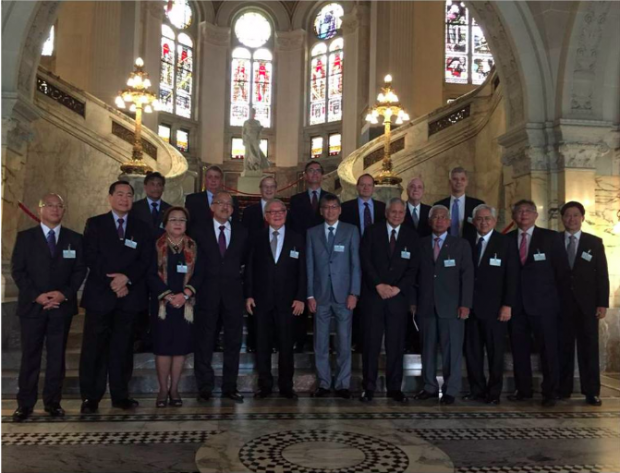
The Philippine delegation to the United Nations Arbitral Tribunal in The Hague. File Photo from the Department of Foreign Affairs
Finally, Mr President, distinguished members of the Tribunal, on behalf of our President, Benigno S Aquino III, on behalf of myself, and on behalf of all the Filipino people, I wish to humbly thank you for the care, dedication, wisdom and courage with which you have conducted these proceedings. We confidently entrust our fate, the fate of the region and indeed the fate of the Convention to you. We know that in your capable hands, the rule of law will not be reduced to the quaint aspiration of a time now past, but rather will be accorded the primacy that the founders of the United Nations and the drafters of UNCLOS envisioned.
Mr President, distinguished members of the Tribunal, we proffer to you once again our deepest gratitude. May I now ask that you kindly invite the Honourable Solicitor General to the lectern to present the final submissions of the Philippines.
For comprehensive coverage, in-depth analysis, visit our special page for West Philippine Sea updates. Stay informed with articles, videos, and expert opinions.
